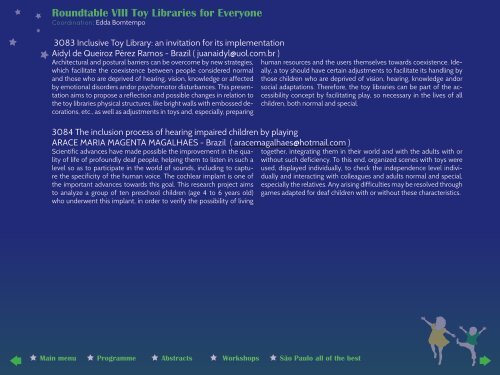Programa completo do Congresso - Associação Brasileira de ...
Programa completo do Congresso - Associação Brasileira de ...
Programa completo do Congresso - Associação Brasileira de ...
Create successful ePaper yourself
Turn your PDF publications into a flip-book with our unique Google optimized e-Paper software.
Roundtable VIII Toy Libraries for Everyone<br />
Coordination: Edda Bomtempo<br />
3083 Inclusive Toy Library: an invitation for its implementation<br />
Aidyl <strong>de</strong> Queiroz Pérez Ramos - Brazil ( juanaidyl@uol.com.br )<br />
Architectural and postural barriers can be overcome by new strategies,<br />
which facilitate the coexistence between people consi<strong>de</strong>red normal<br />
and those who are <strong>de</strong>prived of hearing, vision, knowledge or affected<br />
by emotional disor<strong>de</strong>rs an<strong>do</strong>r psychomotor disturbances. This presentation<br />
aims to propose a reflection and possible changes in relation to<br />
the toy libraries physical structures, like bright walls with embossed <strong>de</strong>corations,<br />
etc., as well as adjustments in toys and, especially, preparing<br />
3084 The inclusion process of hearing impaired children by playing<br />
ARACE MARIA MAGENTA MAGALHAES - Brazil ( aracemagalhaes@hotmail.com )<br />
Scientific advances have ma<strong>de</strong> possible the improvement in the quality<br />
of life of profoundly <strong>de</strong>af people, helping them to listen in such a<br />
level so as to participate in the world of sounds, including to capture<br />
the specificity of the human voice. The cochlear implant is one of<br />
the important advances towards this goal. This research project aims<br />
to analyze a group of ten preschool children (age 4 to 6 years old)<br />
who un<strong>de</strong>rwent this implant, in or<strong>de</strong>r to verify the possibility of living<br />
human resources and the users themselves towards coexistence. I<strong>de</strong>ally,<br />
a toy should have certain adjustments to facilitate its handling by<br />
those children who are <strong>de</strong>prived of vision, hearing, knowledge an<strong>do</strong>r<br />
social adaptations. Therefore, the toy libraries can be part of the accessibility<br />
concept by facilitating play, so necessary in the lives of all<br />
children, both normal and special.<br />
together, integrating them in their world and with the adults with or<br />
without such <strong>de</strong>ficiency. To this end, organized scenes with toys were<br />
used, displayed individually, to check the in<strong>de</strong>pen<strong>de</strong>nce level individually<br />
and interacting with colleagues and adults normal and special,<br />
especially the relatives. Any arising difficulties may be resolved through<br />
games adapted for <strong>de</strong>af children with or without these characteristics.<br />
Main menu Programme Abstracts Workshops São Paulo all of the best


